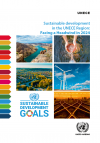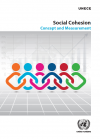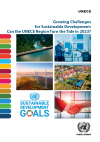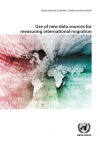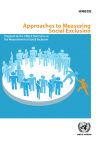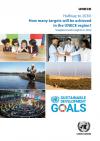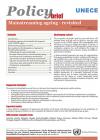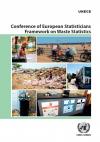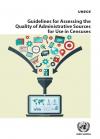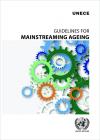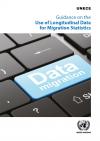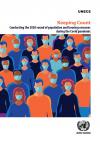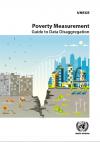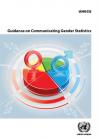Publications
Displaying Results 1 - 20 of 167
- English
ONLINE PUBLICATION
This publication provides the 2024 progress assessment on the Sustainable Development Goals (SDGs) in the region of the United Nations Economic Commission for Europe (UNECE), based on the data available in the United Nations Global SDG Indicators Database.
The results are presented at the regional level, identifying
- English
Social cohesion, broadly speaking, is the ‘glue’ that binds society together.
Societies with higher levels of social cohesion are healthier, more resilient to external shocks, and experience greater economic growth. An understanding of social cohesion helps us make sense of a wide range of topics including globalization, ethnic and group fragmentation, inequalities and barriers to social mobility
- English
UNECE Policy Brief on Ageing No. 28
At any age, intersecting factors such as poverty, disability, social isolation and exposure to abuse can increase the risk of vulnerability and weaken resilience in the case of adverse events. The COVID-19 pandemic, rising inflation, natural disasters, and war are examples of adverse events that have disproportionately affected vulnerable persons, including
- English
ONLINE PUBLICATION
This publication provides a progress assessment on the Sustainable Development Goals (SDGs) in the region of the United Nations Economic Commission for Europe (UNECE), based on the data available in the United Nations Global SDG Indicators Database.
The results are presented at the regional level, identifying the SDG targets that the
- English
Migration and other forms of cross-border mobility are issues of high policy importance. Demands for statistics in these areas have further increased in light of the 2030 Agenda for Sustainable Development and the 2018 Global Compact for Safe, Orderly and Regular Migration. The statistical community continues to be challenged to capture international migration and cross-border mobility in a way
- English
The 2022 UNECE Ministerial Conference on Ageing (Rome, Italy, 16-17 June 2022) concluded the fourth cycle of review and appraisal of the Madrid International Plan of Action on Ageing (MIPAA) and its Regional Implementation Strategy (RIS).
These proceedings provide a summary of the Conference deliberations, as well as a synthesis of the policy progress made between 2017 and 2022 to advance active
- English
The 1989 United Nations Convention on the Rights of the Child obliges parties to ensure all children have a fair chance in life. The development of national and international policies that provide all children and youth the best possible start in life and support a successful transition to adulthood requires robust and reliable information on a wide range of areas affecting children’s lives. The
- English
The Madrid International Plan of Action on Ageing (MIPAA), adopted at the Second World Assembly on Ageing in April 2002, set a comprehensive and bold agenda for ageing-related policies in the 21st century. With the UNECE Regional Implementation Strategy for MIPAA adopted in Berlin the same year, countries drew a roadmap for creating a society for all ages in the region.
This report, issued to
- English
Social exclusion is measured and defined in a range of ways. While many countries measure some aspects of social exclusion, few surveys or statistical methods are specifically designed for this. This publication presents approaches and practices in measuring social exclusion.
The introductory Chapter 1 lays down the motivation behind the work and what is meant by social exclusion
- English
ONLINE PUBLICATION
This publication provides a progress assessment on the Sustainable Development Goals (SDGs) in the region of the United Nations Economic Commission for Europe (UNECE), based on the data available in the United Nations Global SDG Indicators Database.
The assessment identifies targets on which the overall progress in
- English
The population of the UNECE region is ageing: one in four people will be 65 years old or above by 2050 compared to one in six today. Population ageing has social and economic implications for which societies need to prepare. This requires a coordinated, whole-of-government and whole-of-society effort to bring societies and economies into harmony with demographic change, otherwise known as ‘
- English
Official waste statistics have been produced for more than 40 years. They were initially developed to monitor and manage threats to human health and the environment. More recently, information needs have shifted toward realizing the economic value of waste, particularly in the context of the “circular economy”. This change has created demand for information on waste types that have not
- English
The use of administrative data for censuses continues to increase across the countries of the UNECE region and beyond. Administrative sources are used in a wide variety of ways, from supporting operations in a traditional census all the way to fully register-based censuses. It is important that NSOs understand the strengths and limitations of administrative data for use in their censuses, to
- English
The most recent in the series of Policy Briefs on Ageing is "Mainstreaming Ageing - Revisited"Unofficial translation (GER)
See all "
- English
Mainstreaming ageing is a policy strategy directed towards integrating ageing issues into all relevant policy fields on all levels, which helps to adapt to population ageing and ensure the integration of the needs of all ages groups, including older persons, into the policymaking process.
The Guidelines for Mainstreaming Ageing outline five stages that support countries in establishing a
- English
Unequal power relations operate not only in the public world but also in the private sphere, within households. This Guidance has been developed to support national statistical offices in developing ways to measure power in the private sphere, looking at who usually makes decisions about a variety of matters, from routine grocery shopping to saving up for a car, and from seeing a doctor to
- English
As the number of international migrants has grown, it is becoming increasingly important for the public and policymakers to understand migratory flows and the impact of migration on individuals, families, societies and economies. For this, it is necessary to look at change over time, as underscored in the Global Compact for Safe, Orderly and Regular Migration. A longitudinal approach where
- English
When the Covid-19 pandemic broke out in March 2020, preparations for the 2020 round of population and housing censuses were well underway in countries across the UNECE region: some were already in the field, while the majority were in the advanced stages of planning for a 2021 census.
The impacts of the pandemic on census-taking have been wide ranging; from the need for social distancing in
- English
This publication provides guidance on applying various approaches to data disaggregation for measuring poverty and aims to improve the international comparability of poverty statistics. Regardless of how accurate the national measures of poverty are, their usefulness will be limited if they mask existing disparities within societies.
The introductory Chapter 1 lays down the
- English
Gender statistics, like statistics on any other topic, are valuable to users only if they are easily found and accessible, and if users find them relevant and easy to understand. National statistical offices must take extra care when communicating gender statistics to balance the need to remain impartial with the obligation to produce relevant data to inform policymaking and answer the


